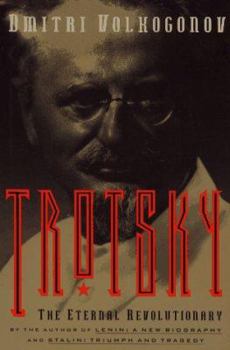Trotsky: The Eternal Revolutionary
Select Format
Select Condition 
Book Overview
A reinterpretation of the life and ruthless career of Leon Trotsky, once known as a tragic figure in Soviet history, is based on Soviet and Western archives, interviews with surviving members of the... This description may be from another edition of this product.
Format:Hardcover
Language:English
ISBN:0684822938
ISBN13:9780684822938
Release Date:March 1996
Publisher:Free Press
Length:560 Pages
Weight:2.00 lbs.
Dimensions:1.5" x 6.5" x 9.6"
Customer Reviews
4 ratings
"TROTSKY- The Eternal Revolutionary"
Published by Thriftbooks.com User , 16 years ago
This is probably the best biography written by Russian military historian Dmitri Volkogonov. Using previously unreleased data from the archives of the KGB and the Russian Communist Party makes this biography of Trotsky unique. He is critical of Trotsky exposing him as no better or worse than his "colleagues" Vladimir Lenin and Joseph Stalin. However I always detected in Leon Trotsky far more honesty and leadership quality than his victorious adversary Joseph Stalin, who was not only a mass murderer but had an uncanny ability for mendacity. It is also my opinion that if Trotsky wouldn't have been assasinated (by order of Stalin) in Mexico in 1940, he would've evolved into an advocate of Progressive Populist Democracy as he slowly realized that it was the very same system that he helped create which caused him to fall from grace in the former and then newly formed USSR. I highly recommend this book.
Trostsky Comes Alive
Published by Thriftbooks.com User , 23 years ago
Volkogonov has written a very sensitive portrait of Trotsky. For specialists, of course, it should be combined with a reading of Deutscher's three-volume biography, but for general readers Volkogonov should suffice. Volkogonov's "Trotsky" is not as scholarly as Deutscher's masterly work, but it's more balanced. The author, a disillusioned former Communist, recognizes Trotsky's genius and portrays him in sympathetic and tragic terms, yet frequently reminds us that his subject was working under fatally flawed premises. Since he doesn't take communism seriously on an intellectual level, he spares us most of the details about theoretical clashes among the Bolsheviks over Marxist interpretations. He also reminds us that even though Trotsky never ceased criticizing Stalin's tyranny, his own role in the development of the murderous role of the CPSU was not innocent. Some readers may justly criticize Volkogonov's haphazard organization of his materials, but I find it doesn't detract from his work, and I rather enjoyed his more personal observations.
The Siren's call
Published by Thriftbooks.com User , 24 years ago
"The entire structure of Leninism is at present based on lies and falsification and carries within it the poisonous seeds of its own destruction." Lev Davidovich Bronshtein, known as Trotsky, the one time Social Democrat, one time political opponent of Lenin, one time war correspondent, one time toast of radical society dilatants, one time People's Commissar for Military and Naval Affairs, one time member of the Bolshevik Central Committee, and finally political fugitive and Stalinist purge victim wrote the above quote in 1913. Dmitri Volkogonov's book, Trotsky, provides a stimulating portrait of this fascinating personality and the various roles/political outlooks that he struggled through.To start let's consider Volkoganov's view of the 2nd Party Congress held in London in the summer of 1903. Far from repeating the usual interpretation, he offers a new one, namely that instead of being simply a question of party organization which divided the Russian Social Democratic Labor Party, it was "over a difference in the theory and practice of revolutionary methodology. The congress formalized the coexistence of two parallel tendencies: one radical, revolutionary and uncompromising, which would characterize the Bolsheviks; the other reformist, evolutionary and parliamentary, which was to become the hallmark of those henceforth known as Mensheviks" page 29. As the author mentions, it is also interesting to note that the original platform of the RSDLP advocated democracy, secret suffrage, inviolability of the person, freedom of thought, speech, press, movement, assembly, strikes and trade unions as well as other similar goals. How did all these noble dreams of a great humanist state end up as a mass gulag? The answer in one word is Lenin. Lenin, the egotistical nihilist, rejected out of hand any "bourgeois theory", relying solely instead on his own interpretation of Marx and Engels. Any non-Bolshevik political opponent was subject to the worst sort of derogatory comments and personal attack. In March of 1917, Lenin arrived in revolutionary Petrograd unwilling to compromise with anyone and enjoying unlimited financial resources thanks to the German General Staff. Trotsky, who had since joined the Bolsheviks, supported Lenin's hard line unquestioningly. While the Provisional Government worried of an attack from the right, Lenin, ever the cynical opportunist, promised an end to the war and land to the peasants. Bolshevik agitators spread through the army to convince the troops to desert or simply ignore the orders of their officers. By October the stage was set, a radical party of limited support and scope was able to overthrow what remained of the Provisional Government with little effort or bloodshed, but by rejecting all compromise and by ruthlessly exercising complete power, Lenin, Trotsky and the Bolsheviks made the Russian Civil War a reality. After the October "Revolution" Trotsky became ever more
Outstanding.
Published by Thriftbooks.com User , 27 years ago
A brilliant insight into the life and times of a man dedicated to the Idea of Revolution first, and socialism, etc, second





